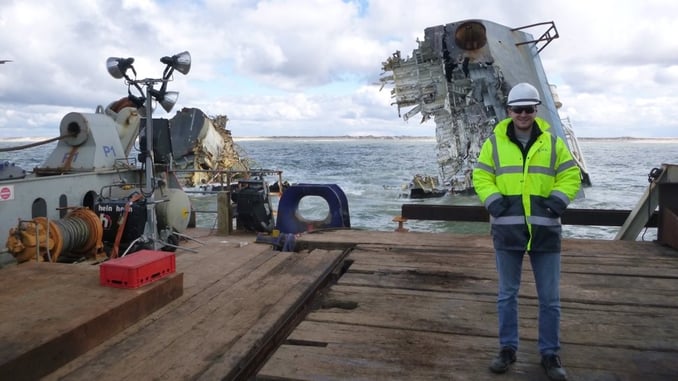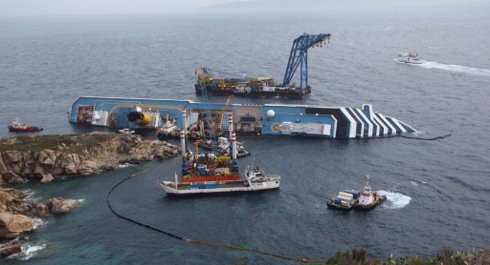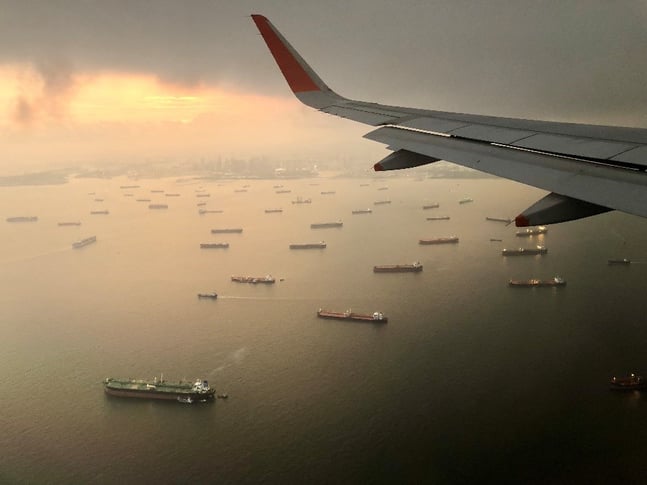On National Maritime Day we talk to our talented Data Strategist, James about his experience as a Consultant Naval Architect, his work at Concirrus, where he sees the industry changing over the next 10 years and much more!
How did you get into the maritime industry?
I started sailing when I was about five years old. I would go sailing with my Dad on the local reservoir which got me hooked on all things maritime from an early age! I knew I wanted to go into an industry with a technical element, so I thought why not combine the two. I studied Naval Architecture at the University of Southampton, graduating after a four-year master’s degree in 2013. On completion of my degree I was offered a job working at LOC Group, an international marine and engineering consulting firm, on their graduate training scheme. Working at LOC gave me the opportunity to work in different parts of the world while gaining invaluable experience within the maritime industry.
What do you enjoy about working in the marine industry?
Having spent several years working around the design, production and repair of vessels you understandably gain an appreciation for these ships that are powering world trade. 90 percent of the world’s goods are transported by ship but not many people have even seen a containership in person so it’s a hidden industry in that sense. More recently it’s been fascinating to see the new appetite for change and innovation in the industry.
One of the main reasons I love working within the sector is the sense of community. It is an incredibly social and interconnected industry with numerous events going on all year round. If you wanted to attend a seminar every week you could and through these events you will meet people from all areas of the industry. I have been lucky enough to create a great professional network from my time working within the industry as well as finding friends for life at the same time.
Tell us about your time working as a Consultant Naval Architect. What drew you to the role? How was the working environment / experience?
I worked for LOC Group for six years as Consultant Naval Architect in Southampton, Singapore and London. The nature of the role I had gave me a very broad understanding of the marine sector which has been extremely useful for my role here at Concirrus. During the first year at LOC I was designing mooring systems for nuclear submarines and then a couple of years later I was involved with the largest wreck removal project in history. When I was working in Singapore, I also had the opportunity to project manage the naval architecture aspects of the conversion of an offshore jack-up drilling rig into a production unit in the Gulf of Thailand. Back in London, my role included providing technical advisory services for several high profile maritime legal disputes. So, all in all very varied but incredibly interesting. I’ve been very lucky to get such broad exposure so early on in my career and having the opportunity to go to different parts of the world and go onboard ships, ship wrecks and attend offshore oil and gas projects has been incredible.
 Sea worker wreck removal – Denmark
Sea worker wreck removal – Denmark
Tell us about your role here at Concirrus?
Joining as Data Acquisition Specialist in November last year, I was brought in to help acquire new data sets, understand what the underlying maritime risks are and how data sets can drive our models to become more predictive. This involves going out into the industry to see where we can get this information from and then onboarding those data sets to power Quest Marine. Although I still do this, part of my new role as Data Strategist is looking more broadly at the long-term data strategy of the company. Having a broad understanding of all parts of the marine sector has been extremely useful for me within my role here, and it is rewarding to be able to apply my previous experience in a new context.
I have also thoroughly enjoyed the opportunity to work with the talented teams here at Concirrus. For example, I have spent time working with Data Science to understand the outputs of our machine learning models to help explain what the information means in practical terms. It is also great to be able to work with our Product teams to see these outputs presented with our software.
Is there a memory of working in that role that made an impact on the way you think about the industry?
I recently spoke about this in my FEDtalk to the team. Back in 2013 I spent two weeks on a large container ship, a brand new ULCV, sailing around Northern Europe. I joined the vessel in Southampton and stayed onboard for various port visits including Hamburg, Rotterdam, Bremerhaven and Le Havre. This experience made me appreciate even more what the shipping industry means on a day to day level. Life on these ships for the crew is a 24-hour job. As a Naval Architect or Data Strategist you can get used to sitting at a desk in front of a screen and not have the appreciation for what daily life onboard a ship is like. It was a brilliant experience where I got to see first-hand what is needed to keep these ships moving around the world. This also allowed me to gain an understanding of the challenges and hazards the crew encounter, whether this is from a navigational aspect on the bridge or engineering issues down in the engine room. I also soon realised that everything revolves around mealtimes - the food is always good!
During bad weather you also gain an appreciation for why so much time, effort and money is spent on making sure ocean-going vessels are safe for everyone onboard. Even on one of these large containerships you can feel very small when sailing through a heavy swell. Some of the wreck removal and salvage cases I’ve worked on also highlighted what it means when things do go wrong, both in terms of potential loss of life and the huge insurance costs.
 Costa Concordia wreck removal – Giglio, Italy
Costa Concordia wreck removal – Giglio, Italy
Tell us more about your experience as a Chartered Engineer and a Member of the Royal Institution of Naval Architects.
The Royal Institution of Naval Architects (RINA) is an internationally renowned professional institution whose members are involved at all levels in the design, construction, maintenance and operation of marine vessels and structures. My route to becoming a Chartered Engineer involved first becoming a member of RINA. I have also had the opportunity to sit on the RINA Council for the last 3 years. The Council meets four times per year to discuss all aspects of the Institution’s operations across the sector, as well as technical challenges faced by the industry.
What do you think are the most important issues within the Maritime industry today?
One of the hot topics in shipping at the moment is emissions. As shipping is such a hidden industry, the environmental impact has historically been overlooked by the public, but there is now a huge amount of pressure to reduce the impact ships have on the world. Various initiatives have been put in place to combat the issue, such as the International Maritime Organization’s (IMO) 2020 regulations that set more stringent global regulatory limits on sulphur in fuel oil used onboard ships . We have already seen the development of the Poseidon Principles in the shipping finance sector to help align banks to IMO decarbonisation targets and I suspect we will see something similar with insurers in the coming years.
Your roles have taken you around the world. What were your favourite places to visit?
Working and living in Singapore for two years was a fantastic experience. From a work perspective Singapore was more like the frontline of shipping where I had the opportunity to spend a lot of time onboard vessels and in shipyards. From my desk in the office in Singapore I had a view across the Singapore Straits. On a couple of occasions during my time there, there would be a collision or casualty out in the Straits and within 30 minutes I would have my hard hat on ready to go onboard the vessel to make an assessment of the incident and report back to the client who was often in London. This was certainly a much less frequent event when I was back in London!
On a personal level it was an amazing place to live. To have Southeast Asia on your doorstep was incredible in terms of travel and the expat social scene was hard to beat!
 Singapore anchorages from above.
Singapore anchorages from above.
You are currently writing a blog series on how COVID-19 is impacting the shipping industry - tell us about it.
Yes, we’re currently working on blog series focusing on the impact of COVID-19 on shipping behaviours. In part one ‘How does a global pandemic impact shipping behaviour?’ we looked at which sectors have been impacted, showing some general trends whilst pointing out the benefits of a data driven approach.
In our most recent blog ‘How has COVID-19 caused risk aggregations in the Caribbean, and what happens next?’ we delved into how the cruise sector has been affected by COVID-19 bringing together insights on how the risk profiles have changed. Working with our data providers, in particular our weather data provider Meteomatics, we were able to piece together how the upcoming hurricane season poses a risk to the cruise ship sector. Getting to do a deep dive into these insights has given us pointers for understanding the changes and the way we look at the data in the future.
You have been at Concirrus over 7 months now what’s been your highlight so far?
Working with a whole range of teams with different skillsets from product developers to data scientists to people directly from the insurance sector. The team is very dynamic which is a great environment to be in. We’re growing quickly and doing something very different from anyone else which is exciting.
What advice would you give to someone looking to make a start in the marine industry?
Gaining broad experience within as many parts of the sector you can is a good start. There are so many routes to go down, whether it’s working in a technical role as a naval architect or going to work for a ship owner, charterer, ship manager, insurer, or even a new technology firm. Having an appreciation for how all of these companies interact is the very useful part I have found.
Networking is key in any industry but particularly so in the marine sector where it is so community driven. Build that network from day one and it will open many doors in the future!
How do you see the industry changing over the next 5-10 years?
The industry is becoming more and more digital. The maritime sector is generally quite far behind the world in terms of using technology but there is now a real drive for innovation. This will only grow in the next decade. The huge benefits and value that technology can offer can no longer be ignored and there will be a lot of new opportunities that come with this.
When I started my career, I had no idea I would end up working at a company like Concirrus, working alongside data scientists and software developers. The industry will need to address the changing requirement for skillsets going forward.
To learn more about how Concirrus are powering the future of insurance head over to our website.

Powering the future of insurance
If you want to book a 1-1 meeting with us then let us know by clicking the link below.
Book a meeting